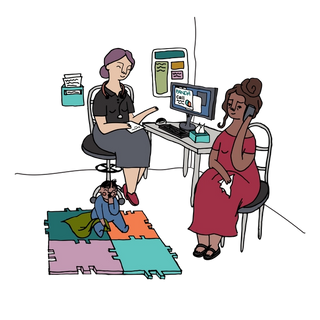How common are mental health issues in the perinatal period?
Several factors make it difficult to estimate how many families are affected by perinatal mental health issues, including variations in data collection methods during research, and different ways of defining or diagnosing mental health conditions.
Background
It’s difficult to know exactly how many parents experience mental health disorders like anxiety and depression during the perinatal period (a time usually defined as pregnancy through the first 12 months of a baby’s life).
Several factors make it difficult to estimate how many families are affected by perinatal mental health issues, including variations in data collection methods during research, and different ways of defining or diagnosing mental health issues. Despite this, there is agreement that mental health disorders in the perinatal period are common, are important public health issues, and can impact the health and wellbeing of the entire family(1).
What we know
For some parents, pregnancy and early parenthood is the first time they’ve ever experienced significant changes to their mental health. Others may come to pregnancy and parenting with a history of mental ill-health. Any mental health disorder present during pregnancy or the first 12 months after birth is considered a ‘perinatal mental health condition’, regardless of whether the person has experienced that mental health disorder previously.
Anxiety and depression are the most common mental health issues in the perinatal period. Until recently most research on mental health in the perinatal period focused primarily on postnatal depression, yet there is a growing body of research into other types of mental ill-health during the perinatal period, including pregnancy.
Researchers are studying mental health disorders like perinatal anxiety and postnatal psychosis. There are new insights emerging about the perinatal mental health of fathers and non-birthing parents, and the mental health impact of complicated pregnancies and traumatic birth experiences.
Some studies are also focusing on the relationship between infant-parent bonding and attachment and mental ill-health during the perinatal period. These changes over the past few decades mean we’re beginning to broaden our understanding of the full scope of perinatal mental health and wellbeing, and efficacy of available treatment options.
“Up to 1 in 5 women experience anxiety and/or depression during pregnancy, and/or following birth.”
Women’s mental health in the perinatal period
Research undertaken in Australia and internationally suggests that around 15-22% of women experience depression during pregnancy and/or following the birth of their baby (2–3).
Current research about perinatal anxiety suggests 1 in 5 women report anxiety symptoms during pregnancy, and between 4-20% of women experience symptoms of an anxiety disorder after giving birth (4).
Between 4.2-9.3% of women will experience both anxiety and depression (5).
Therefore, up to1 in every 5 women may experience symptoms of anxiety, depression, or both during pregnancy and/or following birth.
A small number of women will experience a rare but serious perinatal mental health disorder called postnatal psychosis. Research suggests that 1-2 women per 1000 women giving birth will experience postnatal psychosis (6).
Women may also experience other less common perinatal mental health disorders, such as Post Traumatic Stress Disorder (PTSD), mood disorders including bipolar and schizophrenic disorders (7-9).
The perinatal period is associated with an increased risk of both mental health relapse, and newly diagnosed mental health disorders. Research suggests many women diagnosed with mental health disorders become parents, and it is of utmost importance that their ongoing mental health care needs are identified and treated (10).
“Postnatal psychosis affects one to two new mothers in every 1,000 who give birth”
Men’s mental health in the perinatal period
Though there is far less research available on paternal perinatal mental health, the last decade of research suggests up to 10%, or 1 in 10 expecting or new fathers will experience depression and/or anxiety during the perinatal period (11-14).
A recent review estimates that the prevalence of anxiety in men in the perinatal period is 3.4%-25% (13). Similar to research findings about maternal mental health, often men experience both anxiety and depression during the perinatal period (12).
Having a partner with a mental health disorder is a risk factor for paternal perinatal mental ill-health - and untreated paternal mental health issues are associated with adverse outcomes for maternal mental health during the perinatal period (11).
“Up to 1 in 10 expecting or new fathers experience depression and/or anxiety. ”
Having a partner experiencing mental ill-health is an important risk factor for both maternal and paternal perinatal mental health issues.
Priority populations
Families from minority communities face additional risks for perinatal anxiety and depression, and barriers to accessing safe, appropriate services. Populations more at risk include LGBTIQA+ parented families, Aboriginal and Torres Strait Islander families, and culturally and linguistically diverse families (15-20).
Experiences of discrimination may increase isolation and discourage help-seeking at a time of particular risk for these vulnerable families. The importance of services acknowledging and responding to family diversity will be explored in greater detail in future position statements.
Summary
- Perinatal mental health issues are common, and a crucial public health issue.
- Estimates indicate that up to 1 in 5 women and up to 1 in 10 men will experience anxiety and/or depression in the perinatal period.
- Some families, including LGBTQIA+ parented families, culturally and linguistically diverse and Aboriginal and Torres Strait Islander families face additional challenges to their mental health in the perinatal period.
Helpful Information
What happens when I call the PANDA Helpline?
References
1
Detailed references from this article

